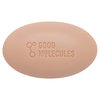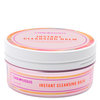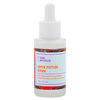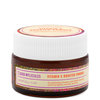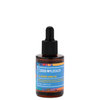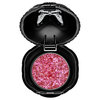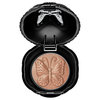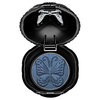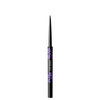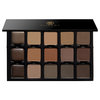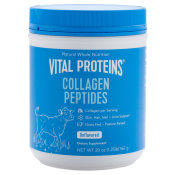Is Collagen the Key to Better Skin?
Published Sep 5, 2018

It’s 2018, and collagen is officially everywhere—from your eye cream to your green smoothie to that fancy iced matcha latte you had this morning. Seemingly overnight, collagen went from the best-kept secret of the paleo/CrossFit crowd to the darling of the beauty and wellness world. And with purported benefits that range from glowier skin to stronger muscles, it’s not hard to see why collagen has caught on so quickly. So what does collagen do, and what’s the best way to add it into your beauty routine? We separate facts from fiction with a little help from science.
First, what is collagen?
Collagen is a protein found naturally in the human body. A major component of our hair, skin, nails, bones, and muscles, it’s often called the “glue” that holds the body together. Our bodies produce collagen by breaking down the amino acids in the protein we eat, like meat, eggs or nuts. We lose collagen gradually as we age (which leads to wrinkles and crepey skin, among other things), but collagen loss is exacerbated by things like smoking, poor diet, and sun exposure.
The different types of collagen
The are 28 known types of collagen, but these are the three most common types.
-
Collagen I makes up over 90% of your body’s collagen. It’s in almost every tissue in your body, from teeth to blood vessels to tendons.
-
Collagen II is mostly found in cartilage.
-
Collagen III is found in a type of connective tissue called reticular fiber, which makes up bone marrow and organs.
As you can see, collagen plays an important role in many of your bodily functions, which is why producing enough of it is vital to your overall health and wellbeing.
The benefits of collagen

Like any buzzy beauty ingredient, there are many claims floating around about what collagen can do, from giving you thicker, fuller hair to curing digestive issues. So far, research has shown that ingesting collagen supplements may:
-
Improve skin elasticity (i.e., give your skin are more plump, bouncy feel)
-
Boost skin hydration
-
Reduce wrinkles and fine lines
-
Prevent UV damage and skin aging
-
Strengthen brittle nails
-
Prevent hair loss and thinning
-
Help muscles heal and grow
-
Support joint health and reduce joint pain
-
Strengthen bones
-
Help wounds heal faster
-
Promote gut health by strengthening the intestinal barrier
-
Promote deeper, more restorative sleep
Sources of collagen

The collagen you see in beauty products and supplements is extracted from the tissue of animals like fish, cows, pigs, or chickens. Collagen supplements contain collagen peptides (aka collagen hydrolysate or hydrolyzed collagen), which is just collagen that has gone through a process called hydrolysis so that your body can more easily digest it. Collagen peptides dissolve in liquids, so they’re easy to incorporate into your diet. You can also get collagen by eating collagen-rich foods, like bone broth. Because collagen is an animal protein, there are unfortunately no vegan sources of collagen—although there are plant-based supplements that help boost the body’s natural collagen production, like The Beauty Chef Collagen Inner Beauty Boost or Moon Juice Beauty Dust.
Collagen in skincare products

While research shows that eating collagen can improve your skin, the science behind topical collagen products is a little more shaky. The molecules in collagen are known to be too large to penetrate the upper layers of your skin, meaning they won’t absorb directly into your crow’s feet and give you bright, youthful-looking eyes. However, collagen does bind with water, making it good at drawing moisture to your skin and maintaining proper hydration levels.
Want to give collagen a try? Collagen powders from Vital Proteins are an easy way to start. From strawberry lemon beauty water to collagen-infused coffee creamer, there’s something for just about everyone.
Illustrations by Megan Badilla
Featured Products
You Might Also Like
-
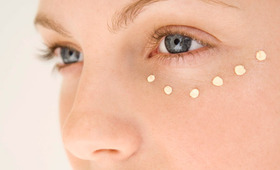
Eye Cream
How Much Would You Pay for an Eye Cream?
- 76
-
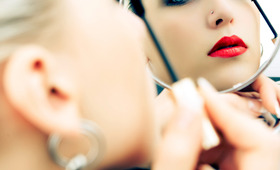
Well-being
Mandatory Pre-Date Prep
- 875
-

Skincare
What's Your Skin Doing While You Sleep?
- 282
-
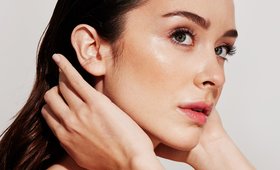
Sun Protection
The Best Products to Prevent Wrinkles
- 75
-
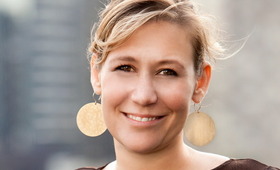
Interviews
Spotlight On: Indie Lee
- 44
-

Face Skincare
The Benefits of Pumpkin in Skin and Hair Care
- 28
-

Wellness
Wake Up Beautiful!
- 724
-
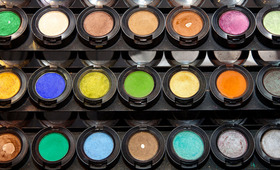
Eco Beauty
Recycled Beauty: How to Responsibly Dump Your Used Makeup
- 200



